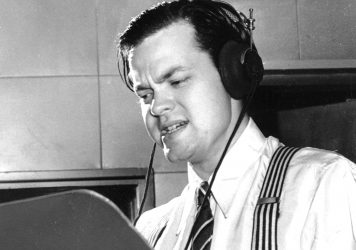Filmmaker Morgan Neville provides a thoughtful examination of American television legend Fred Rogers.
It was songwriter Michael Masser who famously wrote the lyrics “I believe the children are our are future / Teach them well and let them lead the way”. The song ‘The Greatest Love of All’ become most widely associated with Whitney Houston, who covered it in 1985, but these lines of lyrics could just as easily summarise the philosophy of another American icon with an unwavering faith in The Youth: the unassuming, softly-spoken, cardigan-wearing Mister Fred Rogers.
A mainstay of America’s Public Broadcasting Service, Rogers was instrumental in convincing congress to fund the television station during its inception, and for over 30 years was the mastermind behind and star of its flagship programme, Mister Rogers’ Neighborhood – a charming, unchanging children’s television show which ran for an impressive 912 episodes. The show shaped the lives of many viewers, and turned Rogers into an unlikely pop culture icon, beloved across the country by people from all walks of life due to his soothing presence and genuine interest in teaching children about the world through the medium of television.
It’s surprising that it’s taken so long for Rogers (who passed away in 2003) to receive a glossy documentary evaluation, but there’s a sense that Morgan Neville – maestro behind 20 Feet From Stardom and new Orson Welles biopic They’ll Love Me When I’m Dead – is the right man for the job. His interviewees include those who knew Rogers best – among them his wife Joanna, his sons Jim and John, co-star François Clemmons, journalist Tom Junod, and good friend YoYo Ma – as well as some of the ordinary people who were touched by Rogers’ work. Their insights paint a picture of Rogers as a thoroughly decent man with a singular vision of his purpose, interwoven with Neville’s linear exploration of his career.
One surprising narrative device comes in the form of animation, as Neville imagines Rogers in cartoon form as his alter-ego, a small, nervous watch-wearing tiger named Daniel. Such a flourish could seem twee, but rendered in sweet detail it instead feels like a natural progression of Rogers’ own simplistic style which saw Mr Rogers’ Neighborhood virtually unchanged during its entire runtime.
Yet there’s a sense that Neville is reluctant to dig deep in some places – Rogers’ life-long membership of the Republican party only warrants a single line, as does the fact he asked friend and co-star François Clemmons to hide his homosexuality in order to avoid the potential fallout for the show. Similarly the conservative attitude Rogers had to the changing face of television (particularly children’s television) feels smoothed over, as if Neville et al. are afraid to speak ill of the dead. Rogers was radical in deciding to use his platform to teach children about real-world tragedies (the film shows a clip of him speaking about Robert Kennedy’s assassination, and the show was revived for a special episode about 9/11) but his private life doesn’t seem to quite match up.
Even so, there’s no doubting that Rogers was a remarkable man with an uncommon ability to empathise with others. What comes across most in this wholesome doc is his belief in kindness, and the necessity of teaching children to love themselves. It may well resonate most with those who grew up turning to Rogers for guidance, but for those unfamiliar with his work, there’s a lot to enjoy too – not least the feeling that this is a love letter crafted out of images, a form of collective catharsis which resonates during these difficult times.
Published 7 Nov 2018
Is the appeal of Mr Rogers restricted to US audiences?
Nope! I’m crying like a baby!
Not beyond reproach, but a fitting tribute to a pop culture icon.

Fire at Sea director Gianfranco Rosi on filming a rural family in their home in the middle of the migrant crisis.

In I Used to be Normal: A Boyband Fangirl Story, director Jessica Leski meets three generations of women with a common obsession.

A passible Welles hagiography which offers very little that you won’t easily find in an Encyclopedia.